8 Key Insights from the 2020 Interim Executives Survey
Interim Management Around the Globe
The concept of the interim executive may still be unfamiliar to a lot of people. Yet for a growing number of businesses, the benefits of bringing in temporary, high-level outside help have become increasingly clear. While interim executives have an important role to play in helping businesses across a wide range of industries, it’s a specialization that is still not well understood.
To shed new light into this expanding category — who the executives are, who’s hiring them, and the kind of projects they take on, InterimExecs surveyed interim leaders from around the globe. Over six hundred executives completed the survey from the U.S. (75%), Europe (20%), and countries ranging from Brazil to Australia to South Africa.

Predictably, these executives showed impressive backgrounds and education to match, with a majority holding advanced degrees in business management, 18% with Six Sigma training, 15% with CPA credentials, and 36% holding certified credentials ranging from project management professional to mediator. Interestingly, 25% of interim executives served in the military — a route that definitely lends itself to discipline and project solving under pressure.
The 2019 – 2020 Interim Executives Survey revealed useful insights into how the interim executive industry works, and what companies can expect from working with interim, fractional, and project-based executives.

Interim executive roles are on the rise.
Just over a third of executives surveyed feel that opportunities for interim executive roles are remaining consistent, while even more, 47%, see increasing opportunities.

Increasing interim executive roles could be due to growing recognition and awareness of the kind of problems interim executives solve or other trends impacting the interim specialty that executives highlighted in the survey.
Every time a business more successfully weathers the abrupt exit of an executive or manages impressive growth in a previously failing division through the guidance of an interim executive, word spreads that interims are a strong solution for organizations in need of temporary or project-based leadership.
Growth prospects do vary by executive function. CFOs and CIOs were the most likely to say they see an increase in interim opportunities, at 58% and 57% respectively.

Interim executives have held multiple C-Suite titles.

Many interims have held more than one role within the C-Suite. While 61% of respondents held a CEO title, 19% of those CEOs also held a COO or CFO position in past years.
Chief Operating Officer was second most common among interims surveyed at 52%, followed by Chief Financial Officer at 28%. The ranks of interim executives can run the gamut, and other titles were also represented:
- Chief Executive Officer (61%)
- Chief Operating Officer (52%)
- Chief Financial Officer (28%)
- Chief Marketing Officer (16%)
- Chief Information Officer (15%)
- Chief Technology Officer (12%)
- Chief Sales Officer (11%)
- Chief Human Resources Officer (2%)
About a third of interim executives surveyed have held other titles and roles such as Chief Innovation Officer, Chief Restructuring Officer, Interim Executive Director, Chief Security Officer, and Chief Development Officer. That bodes well for companies thinking about going interim. Having held various roles means they can bring more varied experience and a diverse skill set to the companies and projects they take on.

Interim executives report helping companies in varying needs from crisis-mode to fast growth to M&A.
Interim executives were surveyed on a variety of use cases and report that they have likely helped solve just about any type of problem or need a company could experience. Executives gave a long list of issues, opportunities, and challenges they’ve helped guide companies through.
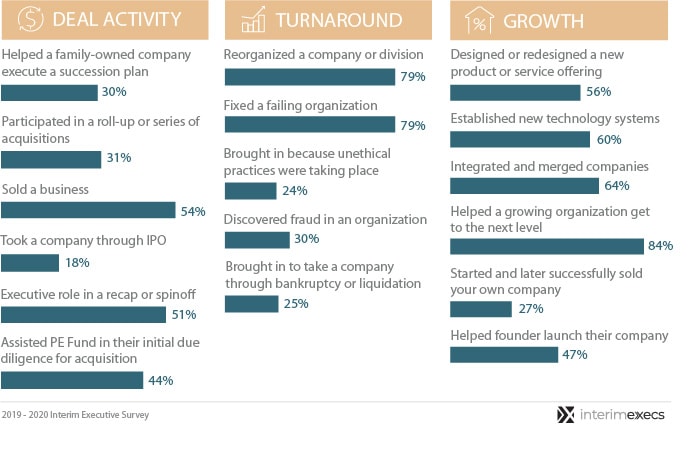
Not surprisingly, one of the top reason interims cited for being called into an organization was to fix what’s broken, with many variations on the theme:
- Fixing a failing organization (79%)
- Reorganizing a company or division (79%)
- Took a company through bankruptcy or liquidation (25%)
- Discovered fraud in an organization (30%)
- Brought in because unethical practice were taking place (24%)
Interim executives are also brought in to help companies that are healthy to perform better. Top reasons include generating new business ideas and strategies, implementation of new plans, building product and running a team, and process and systems improvement. As companies expand, the opportunistic use of an interim executive to speed up growth becomes apparent. Respondents reported:
- Helping a growing organization get to the next level (84%)
- Establishing a new technology system (60%)
- Helping integrate and merge companies (64%)
- Designing a new product or service offering (56%)
The need for interim management is often prompted by the departure of the full-time executive, and many interims take a hands-on approach to finding and onboarding the next permanent hire.
- Replacing an executive who left suddenly (75%)
- Aiding in the process of hiring their own permanent replacement (55%)
In the midst of acquisition, merger, or preparation for sale, many organizations utilize an interim executive to make the deal a reality. Sixty one percent (61%) of interim executives reported having worked for one or more private equity funds – a world where investments in companies are made with the goal of exiting and achieving a superior return on investment.
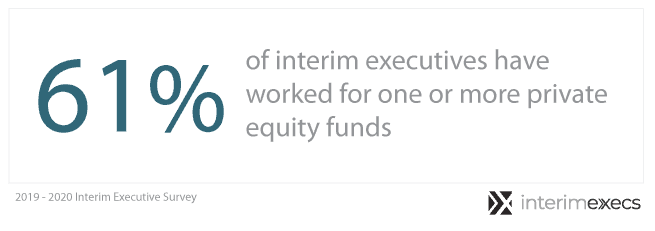
Interim Executives reported leading in various transaction scenarios:
- 54% had a leadership role in selling a company
- 51% had a leadership role in a recap or spinoff
- 44% assisted a private equity fund in their diligence for an acquisition
- 31% participated in a roll-up or series of acquisitions
The survey results show a wide variety of tasks and projects but consistent focus on a formidable executive toolkit.

Interim executive experience spans industries and company types.
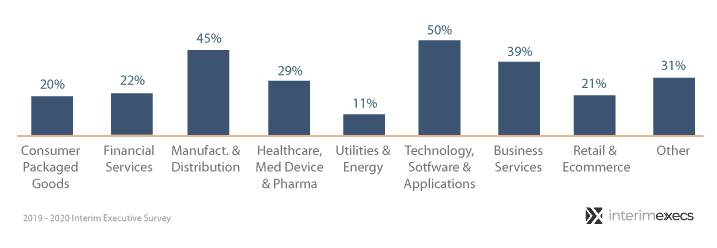
Respondents indicate the need for interim executives isn’t exclusive to any one industry or type of company. Executives detailed a wide range of industries where they’d held C-suite roles. The tech industry is most prominent, with manufacturing a close second:
- Technology (50%)
- Manufacturing (44%)
- Business services (39%)
- Healthcare, Med Device & Pharma (29%)
- Financial services (22%)
- Retail / E-commerce (21%)
- Consumer packaged goods (20%)
Many of the executives surveyed have worked in different industries over the course of their careers and highlighted a range of other sectors from nonprofit to education, hospitality, real estate, government, to logistics.
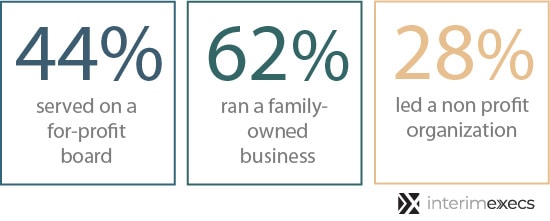
Interim executives report leadership roles ranging from family-owned businesses (62%) to non-profits (28%) to Fortune 500 companies (16%), however, the strongest affinity is between interims and the middle market. Over half of interim executives report working with early stage companies but many more focus in the range up to $200 million revenues. A significant number focus on companies in excess of $200 million revenues, and at the high end 10% of interims work with companies with revenues over $5 billion.

The average interim assignment lasts 8.5 months.
While interim assignments can be as short as several months, the average assignment lasts between 8 and 9 months. Almost 15% of executives report that positions run two years or longer.
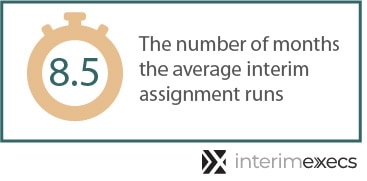

Most interims stick to one or two clients at a time.
The majority of interim executives restrict themselves to one or two projects at a time, with 47% reporting taking no more than one client, and 34% working with two clients concurrently. Almost one in five interim executives will take on three or more clients simultaneously, serving in a part-time or fractional mode where a company can utilize a portion of the executive’s time.


Interims average 10 – 20 years of executive experience.
If you’re going to hire an interim executive, you want confidence of high odds of success. The majority of survey respondents reported 10 to 20 years of executive-level experience. Very few – less than 3% – reported less than five years in the C-suite, while 32% reported 20+ years.
Interim management requires a wealth of experience and perspective that typically comes from serving in many company shapes, sizes and scenarios. It would be rare to see someone straight out of school or at the start of their career in interim management given the carefully honed skillset needed to grow, pivot, or turnaround a company. In fact, nearly 90% are over age 50, and fewer than 1% are under 40 years old.
Seventy-two percent (72%) of survey respondents are in their first decade of taking on interim projects, signaling a shift to more executives taking on interim assignments in recent years. The combination of reported years in full time permanent leadership positions from CEO to CFO to COO, followed by engagements in project roles, means that interim executives have already had plenty of opportunity to encounter and take on a lot of the issues clients would face.

Interim management is a career calling.
Many interim executives (78%) reported three or more interim, fractional, part-time and/or contract roles (defined as situations where an active executive role was taken within the organization…not consulting!). Executives who took on 3 – 6 interim roles in their career came in at 45%, and 24% served in 10 or more C-suite interim positions, representing a wide breadth of interim experience.
These results signal that interim management is not a one and done route. It’s become a career calling. Interim executives intentionally take on one assignment after another to make a positive impact. When asked why they chose the career route of an interim, many executives pointed to the variety of experience:
- “Not being permanently married to the same organization year after year and thus learning and growing in my role and professionally via broad skill set”
- “I’m a life-long learner”
- “Creating significant value and positive impact, life flexibility, assignment variety”
- “Wide experiences and depth of knowledge. I enjoy the degree of challenge, embrace change management and problem-solving skills, team-building acumen, turnaround instincts, balance risk with results, business development and growth orientation, mentoring and practicing leadership”
- “I like to be always challenged and resolve problems in a creative way. Having worked in so many different industries allows me to bring new ideas and best practices from one industry to another.”

I am a problem solver and have excellent organizational and motivational skills. Once the issues are identified and a course of action is established, I am bored and ready to take on a new challenge
2019 – 2020 Interim Executive Survey Response
Many other executives pointed to the satisfaction is seeing results and making a positive impact:
- “I can leave a place in a better or improved position than when I was brought in”
- “There is no greater call than to apply your skills and knowledge to make a difference.”
- “I enjoy the opportunity to empower employees and build teams”
- “I can quickly assess the company and situation and begin to drive effectiveness and efficiencies”
- “I like to see people, customers, and employees grow with given leadership and vision that inspires growth, commerce, and personal development.”
Conclusion
From companies facing declining revenues, to scandals and feeling out of their depth, to those scrambling to fill in the big shoes of an exec who left suddenly, to those just ready to take it to the next level, interim executives step in to serve an impressive array of needs.
Meet InterimExecs RED Team
InterimExecs has spent over a decade hand picking top executives from around the globe to join the RED Team, an elite team of CEOs, CFOs, COOs, CIOs, CMOs, and other C-Suite executives who can parachute into an organization at a moment’s notice. We work with private equity funds, owners, investors, and management teams to provide interim leadership and project-based resources to reach your biggest goals.
Ready to learn more about InterimExecs executive services? Contact us by web or +1 (847) 849-2800 for a confidential discussion.